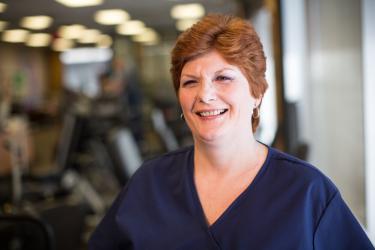





News and Events
The Core of What We Do: Love and Care Go Hand in Hand For Health Coach Chris Holm
Published: May 31, 2023
In “The Core of What We Do,” you’ll learn more about Methodist’s core service lines – primary care, oncology, cardiology, women’s health and orthopedics/surgical services – and the people whose dedication makes them so impactful for our communities.
Chris Holm, RN-BC
Health Coach
Methodist Physicians Clinic

Why is primary care so important to Methodist? How does it uniquely contribute to The Meaning of Care?
Primary care staff members take care of the entire family from birth on. We sometimes have three or four generations of families that our providers take care of. This gives unique insight to knowing the entire family history.
Preventing complications and early detection are the goals. We want our patients to live long and healthy lives. This is done by preventive care such as annual physicals, mammograms, labs and colonoscopies.
Many patients aren’t aware that their annual physical is free with insurance – no copay and no charge visit. Many staff members are involved in sending out letters, calls and portal messages reminding patients that it’s time to schedule their appointment.
Tell us about your role. What’s something surprising about your work?
Diabetics are up to four times more likely to have a stroke or heart attack, even if their diabetes is controlled.
Being a health coach, I work with diabetic patients and provide individual education that includes:
- Explaining what’s happening in their bodies at a level they can understand, what they can do to help control their blood sugars, and information about possible complications
- Showing how to check their blood sugars or apply a continuous glucose monitor
- Discussing foot care information, including what to watch for and report
- Going over their medications – how they work, when to take them and possible side effects
- Collaborating with their provider in finding affordable preferred drugs
- Providing an individualized care plan to follow the patient routinely
- Offering a basic menu and carb counting information until they can meet with a dietitian
- Encouraging some form of exercise daily, working up to 30 minutes a day
Patients are given a diabetic action plan that goes over what their providers expect them to do to manage their diabetes.
In addition to the diabetic management, we call all of our patients who have been discharged from any hospital or emergency department (ED) within two days. We check to make sure they’re taking their medications properly and schedule them to see their primary care provider within 14 days. This also includes transitions from skilled nursing facilities to home. We talk about signs and symptoms to report – what symptoms are considered an emergency and what can wait for their primary care provider to address.
If patients are going to the ED for nonemergent reasons, we try to encourage them to use our urgent care clinics. This helps save costs and frees up the ED.
We also call patients with their test results, explaining them and provider recommendations.
The goal is to keep patients out of the ED and prevent hospital readmission.
What does The Meaning of Care mean to you?
As a nurse, I learned Maslow's hierarchy of needs, a theory of motivation that states that five categories of human needs dictate an individual's behavior. Those needs are physiological, safety, love and belonging, esteem, and self-actualization.
I believe The Meaning of Care is more than that. It’s going above and beyond to help patients in their time of need, meeting them where they are. It’s listening, educating, supporting and providing compassion to them when they’re having a bad day or received a difficult diagnosis. Nursing is making love a reality to mankind.
What’s the best thing about your role at Methodist?
I love the rapport and relationships with my patients and coworkers that I’ve made over the last 11 years working here. The doctors are the best. Some really have a good sense of humor. It’s like a family of people working together to serve our patients.
Why did you come to Methodist, and why have you stayed?
I worked at the Iowa Heart Center in Council Bluffs. The cardiologist I worked with joined Methodist, so I decided to cut down my drive time and applied for the Methodist Physicians Clinic health coach position closer to where I live. I wasn’t sure about the position when I first started. I wasn't sure if I could do the job, and there was so much to learn. But I’m thankful I stuck with it, as it’s been the most enjoyable and rewarding job for me in my nursing career. My daughter is a nurse who works on the cardiac unit at Methodist Hospital. So that speaks volumes of how much I like working at Methodist because I recruited her when she got out of nursing school.
What so you enjoy outside of your time at Methodist?
I have 10 grandchildren. I go to a lot of football, soccer and basketball games. I also enjoy shopping, interior decorating and being with family. My mom used to say, “Life is short. It flies by fast. You have to enjoy all your moments.”
